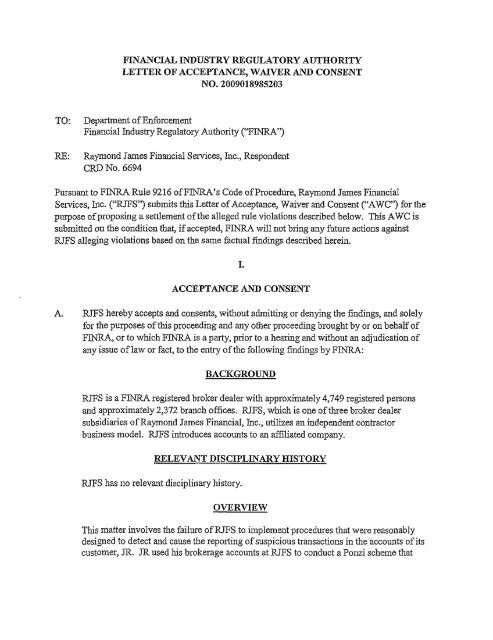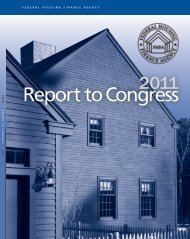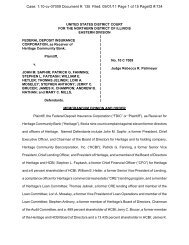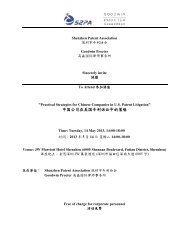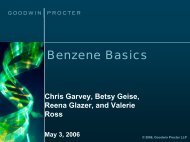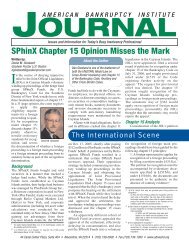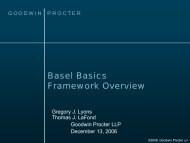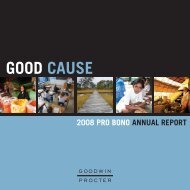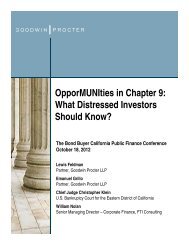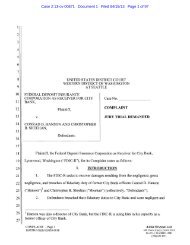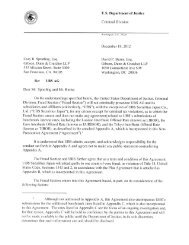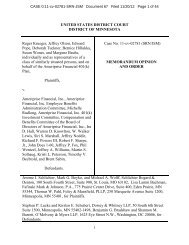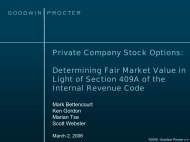Letter of Acceptance, Waiver and Consent - Goodwin Procter LLP
Letter of Acceptance, Waiver and Consent - Goodwin Procter LLP
Letter of Acceptance, Waiver and Consent - Goodwin Procter LLP
Create successful ePaper yourself
Turn your PDF publications into a flip-book with our unique Google optimized e-Paper software.
FINANCIAL INDUSTRY REGULATORY AUTHORITY<br />
LETTER OF ACCEPTANCE, WAIVER AND CONSENT<br />
NO. 2009018985203<br />
TO:<br />
RE:<br />
Department <strong>of</strong> Enforcement<br />
Financial Industry Regulatory Authority ("FINRA")<br />
Raymond James Financial Services, Inc., Respondent<br />
CRD No. 6694<br />
Pursuant to FINRA Rule 9216 <strong>of</strong> FINRA's Code <strong>of</strong> Procedure, Raymond James Financial<br />
Services, Inc. ("RJFS") submits this <strong>Letter</strong> <strong>of</strong> <strong>Acceptance</strong>, <strong>Waiver</strong> <strong>and</strong> <strong>Consent</strong> ("AWC") for the<br />
purpose <strong>of</strong> proposing a settlement <strong>of</strong> the alleged rule violations described below. This AWC is<br />
submitted on the condition that, if accepted, FINRA will not bring any future actions against<br />
RJFS alleging violations based on the same factual findings described herein.<br />
I.<br />
ACCEPTANCE AND CONSENT<br />
A. RJFS hereby accepts <strong>and</strong> consents, without admitting or denying the findings,<strong>and</strong> solely<br />
for the purposes <strong>of</strong> this proceeding <strong>and</strong> any other proceeding brought by or on behalf <strong>of</strong><br />
FINRA, or to which FINRA is a party, prior to a hearing <strong>and</strong> without an adjudication <strong>of</strong><br />
any issue <strong>of</strong> law or fact, to the entry <strong>of</strong> the following findings by FINRA:<br />
BACKGROUND<br />
RJFS is a FINRA registered broker dealer with approximately 4,749 registered persons<br />
<strong>and</strong> approximately 2,372 branch <strong>of</strong>fices. RJFS, which is one <strong>of</strong> three broker dealer<br />
subsidiaries <strong>of</strong> Raymond James Financial, Inc., utilizes an independent contractor<br />
business model. RJFS introduces accounts to an affiliated company.<br />
RELEVANT DISCIPLINARY HISTORY<br />
RJFS has no relevant disciplinary history.<br />
OVERVIEW<br />
This matter involves the failure <strong>of</strong> RJFS to implement procedures that were reasonably<br />
designed to detect <strong>and</strong> cause the reporting <strong>of</strong> suspicious transactions in the accounts <strong>of</strong> its<br />
customer, JR. JR used his brokerage accounts at RJFS to conduct a Ponzi scheme that
esulted in losses <strong>of</strong> approximately $17.8 million to the individuals who provided funds<br />
to him.<br />
Between January 5, 2005 <strong>and</strong> July 11, 2007 (the "relevant time period"), RJFS became<br />
aware <strong>of</strong> numerous red flags suggesting that JR may have been engaged in suspicious or<br />
illegal activity. However, RJFS failed to adequately consider or review many <strong>of</strong> these<br />
red flags in light <strong>of</strong> its Anti-Money Laundering obligations. In many instances, the<br />
information about the red flags was not provided to the firm's AML Officer for<br />
consideration <strong>and</strong> evaluation. After RJFS became aware <strong>of</strong> a suspicious flow <strong>of</strong> funds in<br />
<strong>and</strong> out <strong>of</strong> JR's accounts, it still failed to conduct adequate due diligence or monitoring <strong>of</strong><br />
JR's accounts.<br />
By failing to implement policies <strong>and</strong> procedures that were reasonably designed to detect<br />
<strong>and</strong> cause the reporting <strong>of</strong> suspicious transactions in the accounts <strong>of</strong> JR, RJFS violated<br />
NASD Rule 3011(a), <strong>and</strong>, by virtue <strong>of</strong> that violation, NASD Rule 2110.<br />
Facts<br />
FACTS AND VIOLATIVE CONDUCT<br />
During the relevant time period, JR conducted a Ponzi scheme using his accounts at<br />
RJFS. That scheme resulted in losses <strong>of</strong> over $17 million to his "investors." JR<br />
accomplished this, in part, by periodically transferring funds to his RJFS brokerage<br />
accounts <strong>and</strong> then writing monthly checks to his supposed "investors" from his<br />
brokerage-linked money market account. Many <strong>of</strong> the checks were for identical, rounddollar<br />
amounts each month.<br />
On July 6, 2007, the Ohio Division <strong>of</strong> Securities filed a complaint to place JR's assets,<br />
including his accounts at RJFS, into receivership. On July 17,2007, JR pleaded guilty to<br />
first degree felonies for selling unregistered securities, perjury, <strong>and</strong> forgery. JR was<br />
sentenced to 20 years in prison <strong>and</strong> ordered to pay $17.8 million in restitution to<br />
approximately 200 victims who had provided him with funds.<br />
RJFS Failed To Devote Adequate Resources to Its AML Program<br />
RJFS's Anti-Money Laundering procedures provided that any employee <strong>of</strong> the firm who<br />
became aware <strong>of</strong> "any red flag, or other activity that may be suspicious" was to "notify<br />
the AML Officer." The procedures also provided that RJFS's AML Officer had "full<br />
responsibility for the firm's AML program," <strong>and</strong> was responsible for "developing],<br />
administering], <strong>and</strong> enforce[ing] policies <strong>and</strong> procedures designed to comply with U.S.<br />
AML rules <strong>and</strong> regulations."<br />
The RJFS AML Officer's specific responsibilities also included, among others, reviewing<br />
AML exception reports for suspicious activity, filing Suspicious Activity Reports,<br />
communicating with Branch Managers regarding client actions, <strong>and</strong> conducting risk<br />
assessments <strong>of</strong> any incoming subpoenas concerning client accounts. The AML Officer<br />
2
was also responsible for reviewing approximately 15 lengthy exception reports to identify<br />
potentially suspicious activity.<br />
The RJFS branches were staffed with independent contractors. RJFS's AML program<br />
placed considerable reliance on the RJFS AML Officer's review <strong>of</strong> exception reports to<br />
detect suspicious activity at the branches. These exception reports generally covered<br />
only particular time periods, such as the preceding 30 or 90 days. In spite <strong>of</strong> the<br />
importance that the exception reports played in RJFS's AML program, RJFS did not<br />
maintain a database or other means <strong>of</strong> combining <strong>and</strong> reflecting information generated by<br />
multiple reports.<br />
RJFS did not devote adequate resources to its AML program in light <strong>of</strong> limitations in its<br />
review processes. The AML Officer was responsible for, among other things, overseeing<br />
the AML program with respect to more than 2,000 independent contractor <strong>of</strong>fices,<br />
manually reviewing 15 weekly <strong>and</strong> monthly exception reports for suspicious activity, <strong>and</strong><br />
investigating potentially suspicious activity. Although certain individual reports were<br />
filtered to identify items for further review, the Firm did not centralize or integrate the<br />
information generated by the various reports used by the AML Officer. Moreover,<br />
during the relevant time period, more than 2,100 client accounts — approximately 3.3<br />
accounts per business day •—• were identified as warranting further detailed investigation<br />
by the firm's AML Officer. The resources that RJFS devoted to AML compliance were<br />
inadequate in light <strong>of</strong> these extensive responsibilities.<br />
RJFS Failed to Adequately Investigate Suspicious Activity in JR's Accounts<br />
in addition to executing a large volume <strong>of</strong> options transactions, JR moved large sums <strong>of</strong><br />
money in <strong>and</strong> out <strong>of</strong> his RJFS accounts, in large part to accomplish his Ponzi scheme.<br />
For example, in one ten-<strong>and</strong>-a-half-month period, JR deposited approximately $3.8<br />
million in cash equivalents into one <strong>of</strong> his brokerage accounts <strong>and</strong> then wrote 1302<br />
checks, mostly in round-dollar amounts, withdrawing funds from the account. Many <strong>of</strong><br />
the checks were payments to "investors" <strong>of</strong> JR who were unknowingly participating in<br />
his Ponzi scheme.<br />
During the relevant period, JR's accounts frequently triggered several RJFS exception<br />
reports. JR's accounts appeared on the Firm's Structured Deposit Report almost every<br />
week. The Structured Deposit Report sorted cash equivalent deposits over the preceding<br />
90- <strong>and</strong> 365-day periods in order to detect potential structuring. JR's voluminous check<br />
writing also repeatedly appeared on the Excessive Activity Report generated by RJFS's<br />
affiliate, who shared this information with RJFS. Finally, on several occasions JR's<br />
account appeared on RJFS's Third Party Disbursements Report after JR wired funds to<br />
pay <strong>of</strong>f relatives <strong>of</strong> "investors" who had died or who had sued him.<br />
By the beginning <strong>of</strong>2005, the AML Officer had identified potential money laundering<br />
concerns associated with the flow <strong>of</strong> funds in <strong>and</strong> out <strong>of</strong> JR's account, <strong>and</strong> with JR's<br />
unusual practice <strong>of</strong> writing checks in round dollar amounts. On January 5, 2005, RJFS's<br />
AML Officer emailed the registered representative assigned to JR's accounts, asking the<br />
3
egistered representative to explain the unusual account activity. The AML Officer<br />
specifically referred to the large number <strong>of</strong> deposits in the brokerage account <strong>and</strong> the<br />
large number <strong>of</strong> checks JR then wrote from his money-market account, generally in<br />
round-dollar amounts:<br />
"One <strong>of</strong> the reports I review for suspicious activity monitors for the use <strong>of</strong> cash<br />
equivalents (e.g. money orders, cashier's checks, etc.) [One <strong>of</strong> JR's accounts] has<br />
a history <strong>of</strong> using cash equivalent deposits... [f|or the most part, all <strong>of</strong> your<br />
client's cash equivalents are for over $10k. However, your client does make a<br />
very large number <strong>of</strong> these type <strong>of</strong> deposits (compared to other accounts). Case in<br />
point, in the last 90 days a total <strong>of</strong> 12 cash equivalent deposits totaling ~ $373k<br />
have been made into this account. This concern is then multiplied by the fact that<br />
your client also writes numerous checks out <strong>of</strong> their [money market] sweep<br />
account. These checks are generally in pretty st<strong>and</strong>ard amounts (e.g. $1500.00 as<br />
opposed to say $1497.23 as if they were buying something). What this results in<br />
is a very large amount <strong>of</strong> money is flowing through the account in a suspicious<br />
manner coming in as cash deposits <strong>and</strong> leaving via [money market] checks. I do<br />
see there is some extensive investing in this account, but as I said there is still a<br />
very large flow <strong>of</strong> funds through this account.<br />
The PATRIOT Act requires that we monitor for suspicious activity in accounts.<br />
One practice that raises suspicion is the use <strong>of</strong> cash equivalents, <strong>and</strong>/or the flow <strong>of</strong><br />
funds into <strong>and</strong> back out <strong>of</strong> an account. Therefore, would you please provide me<br />
with an explanation as to why your client makes transactions in this manner."<br />
In response, the registered representative provided the following explanation for the<br />
account activity:<br />
"I have known [JR] for over 25 years [JR] is a very successful<br />
businessman. He not only has a portfolio <strong>of</strong> stock <strong>and</strong> options, but also<br />
Real estate, cars, <strong>and</strong> a very successful insurance firm. The deposits that<br />
come into his account are the proceeds from the periodic sales <strong>of</strong> these<br />
numerous assets. The income that he makes from the call options is used<br />
to fund his ventures into real estate, cars, <strong>and</strong> the expenses that go along<br />
with those transactions. [JR] is a meticulous bookkeeper <strong>and</strong> likes to have<br />
a paper trail for all transactions. Therefore he prefers Bank Checks to<br />
conduct transactions because <strong>of</strong> the reasons listed previously.... I can<br />
vouch for [JR's] honesty <strong>and</strong> integrity. I feel that Raymond James has<br />
nothing to be concerned with. If you have any additional questions, please<br />
let me know."<br />
Over the next two <strong>and</strong> a half years, RJFS's AML Officer continued to email the<br />
registered representative about the round-dollar check writing <strong>and</strong> flow <strong>of</strong> funds in <strong>and</strong><br />
out <strong>of</strong> the account. Specifically, in October 2005 <strong>and</strong> again in August 2006, the AML<br />
Officer emailed the registered representative about the numbers <strong>of</strong> deposits <strong>and</strong> checks in<br />
JR's account, <strong>and</strong> sought further details <strong>of</strong> the activity, noting that JR "makes numerous<br />
4
deposits via cash equivalents totaling hundreds <strong>of</strong> thous<strong>and</strong>s <strong>of</strong> dollars each month." For<br />
example, on October 4, 2005, the AML Officer wrote:<br />
"[T]his account appears on one <strong>of</strong> my reports I review quite frequently.. .As you<br />
presumably know, [JR] makes numerous deposits via cash equivalents totaling<br />
hundreds <strong>of</strong> thous<strong>and</strong>s <strong>of</strong> dollars each month. Per your email below you<br />
explained that these were proceeds from the periodic sale <strong>of</strong> his assets, but from<br />
the level <strong>of</strong> deposits this would mean he sells quite a large number <strong>of</strong> (large<br />
ticket) items??? .... And I am curious to know what all the [money market] checks<br />
are for?? He routinely writes numerous checks, almost always for even dollar<br />
amounts."<br />
On August 22,2006, the AML Officer again contacted the registered representative<br />
assigned to JR's account with the same concerns:<br />
"[Since October 2005] there has been approx $3.8 million dollars <strong>of</strong> cash<br />
equivalents (<strong>of</strong>ficial checks, cashiers checks, etc) deposited into the<br />
account <strong>and</strong> 1302 [money market] checks written totaling ~$3.9+ million.<br />
A flow <strong>of</strong> funds into <strong>and</strong> back out <strong>of</strong> an account can be a sign <strong>of</strong> money<br />
laundering. While I am certainly not implying anything <strong>of</strong> this sort has<br />
taken place I do have the responsibility to question the activity <strong>and</strong><br />
document your reply. Could you please take a moment <strong>and</strong> provide me<br />
with the crrcumstances surrounding this activity <strong>and</strong> any additional<br />
detail(s) you think I should be aware <strong>of</strong>."<br />
In response to each <strong>of</strong> these emails, the registered representative assigned to the account<br />
provided the same explanation for the account activity—that the large flow <strong>of</strong> funds in<br />
<strong>and</strong> out <strong>of</strong> the account resulted from JR's dealings in real estate <strong>and</strong> cars. This<br />
information had been obtained several years earlier when JR opened his firstaccount<br />
with RJFS. In spite <strong>of</strong> the unusual nature <strong>of</strong> the response, no one at RJFS attempted to<br />
pursue the concerns about JR's account activity directly, contact the branch manager, or<br />
ascertain whether JR had been asked about the account activity. Nor did anyone at RJFS<br />
conduct an adequate review <strong>of</strong> the checks JR had written, even though they were<br />
presented to the RJFS AML <strong>of</strong>ficer for review. Instead, RJFS relied on the information<br />
provided by the registered representative <strong>and</strong> a Lexis report that listed JR's properties <strong>and</strong><br />
vehicle registrations. The registered representative never adequately explained, <strong>and</strong> RJFS<br />
never determined, why JR frequently wrote checks in round dollar amounts.<br />
RJFS Failed to Implement its AML Program to Adequately Consider<br />
Numerous Red Flags Related to JR's Accounts<br />
During the relevant time period, different departments at RJFS failed to share information<br />
about potential red flags concerning suspicious activity in JR's accounts with each other<br />
<strong>and</strong> with the firm's AML Officer. For instance, RJFS's Legal Department failed to<br />
inform the AML Officer about a criminal inquiry <strong>and</strong> allegations that JR had converted<br />
funds <strong>and</strong> deposited them into his RJFS account. Similarly, the local branch <strong>of</strong>fice where<br />
5
JR's accounts-were located failed to report red flags related to JR's account activity <strong>and</strong><br />
legal troubles to the AML <strong>of</strong>ficer. The firm's AML Officer also failed to adequately<br />
review information they were provided.<br />
Even with respect to information that was provided to the firm's AML Officer, RJFS<br />
failed to adequately implement its procedures to review that information. For example,<br />
checks written by JR fromhis money market account showed that he was writing round<br />
dollar checks in identical amounts to the same individuals each month. Although the<br />
checks were specifically provided to RJFS's AML Officer for review, an adequate review<br />
<strong>of</strong> those checks was never conducted.<br />
As a result <strong>of</strong> these failings, RJFS did not adequately consider certain red flags related to<br />
activity in JR's accounts that were indicative <strong>of</strong> suspicious activity. These red flags<br />
included the following:<br />
1. A civil complaint was served on RJFS by a relative <strong>of</strong> JR alleging that JR had<br />
converted funds, deposited them into his RJFS accounts, <strong>and</strong> improperly acted as an<br />
investment advisor. Although RJFS was aware <strong>of</strong> the .lawsuit <strong>and</strong> had reviewed the<br />
complaint, no one at RJFS provided the AML Officer with a copy <strong>of</strong> the complaint.<br />
Likewise, no one at RJFS informed the AML Officer that JR had "invested" a<br />
relative's money in his RJFS account.<br />
2. RJFS's AML Officer was provided with a subpoena issued to RJFS "by the Ohio<br />
Division <strong>of</strong> Securities that sought information about JR's accounts. However,<br />
because RJFS failed to adequately review that subpoena, RJFS AML personnel took<br />
no further action with respect, to the subpoena.<br />
3. JR had questioned the branch manager at the <strong>of</strong>fice where his account was located<br />
about the possibility <strong>of</strong> investing on behalf <strong>of</strong> others using his RJFS accounts. No<br />
one at the branch informed the firm's AML Officer <strong>of</strong> these facts.<br />
4. In early June <strong>of</strong>2007, the registered representative assigned to JR's accounts received<br />
a Gr<strong>and</strong> Jury Subpoena to testify <strong>and</strong> provide documents about JR, Although a copy<br />
<strong>of</strong> the subpoena was provided to RJFS on June 5, 2007, no one informed the AML<br />
Officer <strong>of</strong> the subpoena, even though RJFS's procedures required its AML Officer to<br />
review <strong>and</strong> conduct a risk assessment <strong>of</strong> any customer who was the subject <strong>of</strong> a<br />
subpoena.<br />
5. Several weeks before the Ohio Division <strong>of</strong> Securities initiated the complaint to seize<br />
JR's assets, JR told personnel at the branch <strong>of</strong>fice where his account was located that<br />
he had been investing on behalf <strong>of</strong> "family members" using his RJFS accounts. No<br />
one at the branch informed the firm's AML Officer <strong>of</strong> these facts.<br />
6. Shortly before the Ohio Division <strong>of</strong> Securities initiated the complaint to seize JR's<br />
assets, JR told local branch personnel that he had committed fraud <strong>and</strong> was going to<br />
jail. No one at the RJFS branch provided this information to the firm's AML Officer.<br />
6
Because RJFS did not adequately identify or consider numerous red flags related to JR's<br />
accounts, it also failed to adequately consider whether it should file a Suspicious Activity<br />
Report with respect to the accounts, as required by the Bank Secrecy Act <strong>and</strong> the<br />
implementing regulations promulgated thereunder.<br />
RJFS Failed to Conduct Adequate Monitoring <strong>of</strong> JR's Accounts<br />
In part because <strong>of</strong> the inadequate investigation described above, RJFS also failed to<br />
conduct adequate monitoring <strong>of</strong> JR's accounts. The firm's AML Officer recognized that<br />
JR wrote checks in "round dollar amounts," frequently to the same individuals, <strong>and</strong><br />
identified the flow <strong>of</strong> funds into <strong>and</strong> out <strong>of</strong> the accounts as a potential problem, ha spite<br />
<strong>of</strong> this, RJFS did not adequately follow up on these concerns. For instance, RJFS did not<br />
follow up when the registered representative failed to provide an explanation for the fact<br />
that the checks were written in round dollar amounts. RJFS also failed to review JR's<br />
physical account file, which would have demonstrated JR's pattern <strong>of</strong> depositing third<br />
party stock certificates. The firm's Stock Receive Department, which it had outsourced<br />
to its affiliate, also failed to monitor JR's repeated deposits <strong>of</strong> third party stock<br />
certificates. 1<br />
Finally, RJFS failed to contact the Branch Manager about JR's account<br />
activity—even though the firm's AML Procedures specifically tasked the AML Officer<br />
with communicating with Branch Managers.<br />
As described above, RJFS also devoted inadequate resources to its AML program in light<br />
<strong>of</strong> the limitations <strong>of</strong> its review processes. In addition, RJFS's AML Officer was unable to<br />
review, as a practical matter, the various instances that JR's accounts had triggered the<br />
firm's exception reports. The firm's processes did not realistically allow the AML<br />
Officer to call up each <strong>of</strong> the past instances in which JR's accounts had triggered those<br />
reports.<br />
Because RJFS did not conduct adequate monitoring <strong>of</strong> JR's accounts, it also failed to<br />
adequately consider whether it should file a Suspicious Activity Report with respect to<br />
the activity in the accounts, as required by the Bank Secrecy Act <strong>and</strong> the implementing<br />
regulations promulgated by the Department <strong>of</strong> the Treasury.<br />
Violations<br />
RJFS Violated NASD Rules 3011(<strong>and</strong> 2110?<br />
NASD Conduct Rule 3011(a) requires that member firmsmust, at a minimum, "establish<br />
<strong>and</strong> implement policies <strong>and</strong> procedures that can be reasonably expected to detect <strong>and</strong><br />
cause the reporting <strong>of</strong> suspicious transactions required under 31 U.S.C. 5318(g) <strong>and</strong> the<br />
JR repeatedly deposited third party stock certificates into his accounts <strong>and</strong> sometimes accepted<br />
physical stock certificates from the investors in his Ponzi scheme.<br />
2<br />
Effective January 1, 2010, NASD Rule 3011 became FINRA Rule 3310.<br />
7
implementing regulations thereunder." In developing its AML program, a broker-dealer<br />
should consider factors such as its size, location, business activities, the types <strong>of</strong> accounts<br />
it maintains, <strong>and</strong> the types <strong>of</strong> transactions in which its customers engage. 1<br />
Two FINRA<br />
Notices to Members, 02-21 <strong>and</strong> 02-47, emphasize a member's duty to detect "red flags"<br />
<strong>and</strong>, if detected, to "perform additional due diligence before proceeding with the<br />
transaction."<br />
As described above, RJFS failed to implement policies <strong>and</strong> procedures that could<br />
reasonably have been expected to detect <strong>and</strong> cause the reporting <strong>of</strong> suspicious activity in<br />
the accounts <strong>of</strong> JR, who was operating a Ponzi scheme. Numerous red flags were either<br />
not provided for review, or not adequately considered, by the firm. Even after the firm<br />
became aware <strong>of</strong> a highly unusual flow <strong>of</strong> funds in <strong>and</strong> out <strong>of</strong> the accounts, it failed to<br />
conduct adequate due diligence or monitoring <strong>of</strong> the activity in JR's accounts, in part<br />
because the firm devoted inadequate resources to its AML department.<br />
" By failing to implement policies <strong>and</strong> procedures that were reasonably designed to detect<br />
<strong>and</strong> cause the reporting <strong>of</strong> suspicious transactions in the accounts <strong>of</strong> JR, RJFS violated<br />
NASD Rules 3011(a) <strong>and</strong> 2110.<br />
B. RJFS also consents to the imposition <strong>of</strong> the following sanctions:<br />
1. A censure;<br />
2. A fine in the amount <strong>of</strong> $400,000; <strong>and</strong>,<br />
3. The undertaking described below.<br />
Undertaking: RJFS shall conduct a comprehensive review <strong>of</strong> the adequacy <strong>of</strong> its AML<br />
policies, systems, procedures (written <strong>and</strong> otherwise), <strong>and</strong> training. At the conclusion <strong>of</strong><br />
the review, which shall be no more than 90 days after the date <strong>of</strong> the Notice <strong>of</strong><br />
<strong>Acceptance</strong> <strong>of</strong> this AWC, RJFS shall certify that its procedures are reasonably designed<br />
to achieve compliance with FINRA Rule 3310 (formerly NASD Rule 3011). The<br />
certification shall be provided in a written letter to FINRA staff, <strong>and</strong> signed by a<br />
corporate <strong>of</strong>ficer <strong>of</strong> RJFS on behalf <strong>of</strong> RJFS. The letter should identify the Respondent<br />
<strong>and</strong> the case number, <strong>and</strong> shall be submitted by e-mail to<br />
EnforcementNotice@FINRA.org <strong>and</strong> by letter to Thomas Kimbrell, Senior Counsel,<br />
FINRA, Department <strong>of</strong> Enforcement, 1801 K Street NW, Suite 800, Washington DC<br />
20006. In addition, at the time the certification is provided, RJFS will provide the staff<br />
with a copy <strong>of</strong> its procedures relating to compliance with FINRA Rule 3310.<br />
RJFS agrees to pay the monetary sanctions) upon notice that this AWC has been<br />
1<br />
See Notice to Members 02-21 at 4.<br />
8
accepted <strong>and</strong> that such payment(s) are due <strong>and</strong> payable. RJFS has submitted an Election<br />
<strong>of</strong> Payment form showing the method by which the firm proposes to pay the fine<br />
imposed.<br />
RJFS specifically <strong>and</strong> voluntarily waives any right to claim that the firm is unable to pay,<br />
now or at any time hereafter, the monetary sanction(s) imposed in this matter.<br />
The sanctions imposed herein shall be effective on a date set by FINRA staff.<br />
II.<br />
WAIVER OF PROCEDURAL RIGHTS<br />
RJFS specifically <strong>and</strong> voluntarily waives the following rights granted under FINRA's Code <strong>of</strong><br />
Procedure:<br />
A. To have a Complaint issued specifying the allegations against it;<br />
B. To be notified <strong>of</strong> the Complaint <strong>and</strong> have the opportunity to answer the<br />
allegations in writing;<br />
C. To defend against the allegations in a disciplinary hearing before a hearing panel,<br />
to have a written record <strong>of</strong> the hearing made <strong>and</strong> to have a written decision issued;<br />
<strong>and</strong>,<br />
D. To appeal any such decision to the National Adjudicatory Council ("NAC") <strong>and</strong><br />
then to the U.S. Securities <strong>and</strong> Exchange Commission <strong>and</strong> a U.S. Court <strong>of</strong><br />
Appeals.<br />
Further, RJFS specifically <strong>and</strong> voluntarily waives any right to claim bias or prejudgment <strong>of</strong> the<br />
General Counsel, the NAC, or any member <strong>of</strong> the NAC, in connection with such person's or<br />
body's participation in discussions regarding the terms <strong>and</strong> conditions <strong>of</strong> this AWC, or other<br />
consideration <strong>of</strong> this AWC, including acceptance or rejection <strong>of</strong> this AWC.<br />
RJFS further specifically <strong>and</strong> voluntarily waives any rightto claim that a person violated the ex<br />
parte prohibitions <strong>of</strong> FINRA Rule 9143 or the separation <strong>of</strong> functions prohibitions <strong>of</strong> FINRA<br />
Rule 9144, in connection with such person's or body's participation in discussions regarding the<br />
terms <strong>and</strong> conditions <strong>of</strong> this AWC, or other consideration <strong>of</strong> this AWC, including its acceptance<br />
or rejection.<br />
9
III.<br />
OTHER MATTERS<br />
RJFS underst<strong>and</strong>s that:<br />
A. Submission <strong>of</strong> this AWC is voluntary <strong>and</strong> will not resolve this matter unless <strong>and</strong><br />
until it has been reviewed <strong>and</strong> accepted by the NAC, a Review Subcommittee <strong>of</strong><br />
the NAC, or the Office <strong>of</strong> Disciplinary Affairs ("ODA"), pursuant to FINRA Rule<br />
9216;<br />
B. If this AWC is not accepted, its submission will not be used as evidence to prove<br />
any <strong>of</strong> the allegations against RJFS; <strong>and</strong><br />
C. If accepted:<br />
1. this AWC will become part <strong>of</strong> RJFS's permanent disciplinary record <strong>and</strong><br />
may be considered in any future actions brought by FINRA or any other<br />
regulator against RJFS;<br />
2. this AWC will be made available through FINRA's public disclosure<br />
program in response to public inquiries about my disciplinary record;<br />
3. FINRA may make a public announcement concerning this agreement <strong>and</strong><br />
the subject matter there<strong>of</strong> in accordance with FINRA Rule 8313; <strong>and</strong><br />
4. RJFS may not take any action or make or permit to be made any public<br />
statement, including in regulatory filings or otherwise, denying, directly or<br />
indirectly, any finding in this AWC or create the impression that the AWC<br />
is without factual basis. RJFS may not take any position in any<br />
proceeding brought by or on behalf <strong>of</strong> FINRA, or to which FINRA is a<br />
party, that is inconsistent with any part <strong>of</strong> this AWC. Nothing in this<br />
provision affects RJFS's right to take legal or factual positions in litigation<br />
or other legal proceedings in which FINRA is not a party.<br />
D. RJFS may attach a Corrective Action Statement to this AWC that is a statement <strong>of</strong><br />
demonstrable corrective steps taken to prevent future misconduct. RJFS<br />
underst<strong>and</strong>s that it may not deny the charges or make any statement that is<br />
inconsistent with the AWC in this Statement. This Statement does not constitute<br />
factual or legal findingsby FINRA, nor does it reflect the views <strong>of</strong> FINRA or its<br />
staff.<br />
The undersigned, on behalf <strong>of</strong> the Firm, certifies that a person duly authorized to act on its behalf<br />
10
has read <strong>and</strong> underst<strong>and</strong>s all <strong>of</strong> the provisions <strong>of</strong> this AWC <strong>and</strong> has been given a full opportunity<br />
to ask questions about it; that RJFS has agreed to its provisions voluntarily; <strong>and</strong> that no <strong>of</strong>fer,<br />
threat, inducement, or promise <strong>of</strong> any kind, other than the terms set forth herein <strong>and</strong> the prospect<br />
<strong>of</strong> avoiding the issuance <strong>of</strong> a Complaint, has been made to induce RJFS to submit it.<br />
*/ZS/ZQ/2~<br />
Date (mrn/dd/yyyy)<br />
Respondent<br />
Raymond James Financial Services, Inc.<br />
Gerald J. Russello<br />
Paul M. Tyrrell<br />
• Counsel for Respondent<br />
Bingham McCutchen <strong>LLP</strong><br />
2020IC Street NW<br />
Washington, DC 20006-1806<br />
202-373-6159<br />
Accepted by FINRA:<br />
Signed on behalf <strong>of</strong> the<br />
Director <strong>of</strong> ODA, by delegated authority<br />
Thomas^B. Lawson<br />
Vice President <strong>and</strong> Chief Counsel<br />
FINRA Department <strong>of</strong> Enforcement<br />
1801 K Street NW, Suite 800<br />
Washington, DC 20006<br />
11


